Eternal Sunshine of the Spotless Mind Blu-ray Movie
HomeEternal Sunshine of the Spotless Mind Blu-ray Movie 
Universal Studios | 2004 | 108 min | Rated R | Jan 25, 2011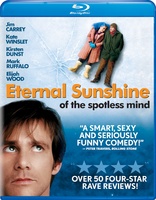
Price
List price:Amazon: $7.00 (Save 12%)
Third party: $7.00 (Save 12%)
Usually ships within 2 to 4 weeks
Movie rating
8.5 | / 10 |
Blu-ray rating
| Users | 4.5 | |
| Reviewer | 4.0 | |
| Overall | 4.1 |
Overview
Eternal Sunshine of the Spotless Mind (2004)
Joel is stunned to discover that his girlfriend Clementine has had the memories of their tumultuous relationship erased. Out of desperation, he contacts the inventor of the process, Dr. Howard Mierzwiak, to have Clementine removed from his own memory. But as Joel's memories progressively begin to disappear, he begins to discover their earlier passion. From deep within the recesses of his brain, Joel attempts to escape the procedure. As Dr. Mierzwiak and his crew chase him through the maze of his memories, it's clear that Joel can't get Clementine out of his head.
Starring: Jim Carrey, Kate Winslet, Kirsten Dunst, Mark Ruffalo, Elijah WoodDirector: Michel Gondry
| Drama | Uncertain |
| Surreal | Uncertain |
| Romance | Uncertain |
| Imaginary | Uncertain |
Specifications
Video
Video codec: MPEG-4 AVC
Video resolution: 1080p
Aspect ratio: 1.85:1
Original aspect ratio: 1.85:1
Audio
English: DTS-HD Master Audio 5.1 (48kHz, 24-bit)
French: DTS 5.1 (48kHz, 24-bit)
Subtitles
English SDH, French
Discs
50GB Blu-ray Disc
Single disc (1 BD)
BD-Live
Mobile features
Playback
Region free
Review
Rating summary
| Movie | 4.5 | |
| Video | 3.5 | |
| Audio | 4.0 | |
| Extras | 3.0 | |
| Overall | 4.0 |
Eternal Sunshine of the Spotless Mind Blu-ray Movie Review
“Please let me keep this memory, just this one.”
Reviewed by Casey Broadwater January 31, 2011A fractured romance about fated lovers and a metaphysical comedy that explores the pains and pleasures of memory, Eternal Sunshine of the Spotless Mind is a strange take on the Orpheus/Eurydice story, as idiosyncratic screenwriter Charlie Kaufman (Synecdoche, New York) and French music video director Michel Gondry (The Science of Sleep) replace the underworld with the dark recesses of their main character’s mind. The pair’s first collaboration —the high concept screwball comedy Human Nature—was ambitious but ultimately unsuccessful; here, their enigmatic individual styles mesh perfectly to create a moving, sometimes devastating film that non-linearly captures the heart-swelling highs and soul-crushing lows of a modern relationship.
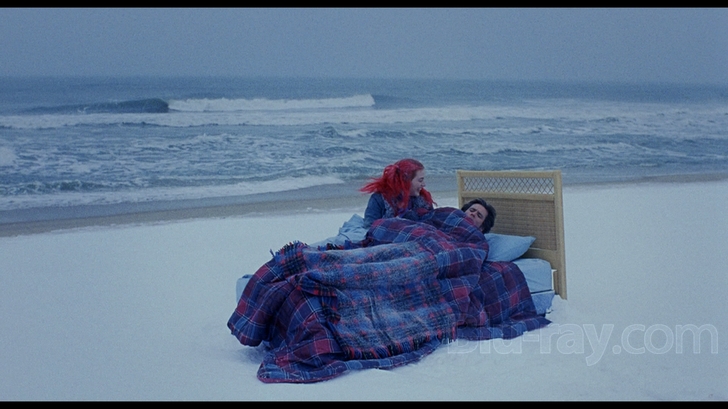
Jim Carrey—yes, that Jim Carrey—stars as sad-sack everyman Joel Barish, who awakes at the beginning of the film in an inexplicable funk. On a whim, he decides to blow off work and take the train to Montauk, where he walks along the beach in the snow. It’s freezing. He has no idea why he’s there. He pulls out his diary and notices nearly a ream’s worth of missing pages. “It appears this is my first entry in two years,” he says. This is our first sign that something’s awry. In a diner, he notices a flaming orange-haired woman and—what do you know—on the ride home they find themselves in the same train car, where they strike up a deja vu-inducing conversation. She’s Clementine Krucznski (Kate Winslet), a self-described “vindictive little bitch, truth be told,” who applies her “personality in a paste.” (Her hair will change colors numerous times throughout the film.) She’s spunky, and perhaps overassertive, but she knows what she wants—Joel, who seems almost terrified of her at first, but quickly falls head over proverbial heels. Back in New York, they embark on a timid relationship. She fixes them drinks in her apartment. He promises to call her when he gets home to wish her a happy Valentine’s Day. The two get on well—too well. It’s like they’ve known each other for years.
And that’s because they have. Or, at least, they used to. It’s complicated.
The core conceit of the film is that a company called Lacuna, Inc. has developed a procedure that can selectively erase a person’s memories, usually to alleviate heartbreak. (They have a Valentine’s Day special.) The process involves collecting all the detritus of a failed relationship—the love letters and drawings, the trinkets, ticket stubs, and anniversary gifts—and using these meaning-laden items to construct a kind of neural pathway in the patient’s mind. Then, Lacuna’s technicians enter the patient’s home while he’s asleep—they pre-supply a handy self-administered knock-you-out pill —hook the poor sap up to a machine that looks like a hair dryer from some old school salon, and zap out the unwanted remembrances. In the morning, all those depressing, heartsick feelings are gone. As Dr. Howard Mierzwiak (Tom Wilkinson), the inventor of the procedure, explains, it’s technically brain damage, “on a par with a night of heavy drinking, nothing you’ll miss.” And it’s a fresh start. Theoretically.
Joel and Clementine, we learn, had dated for two years before a messy split prompted Clementine to erase Joel from her memory. Joel finds out about this by accident and, in a fit of retribution, decides to have the procedure done as well. Most of the film takes place inside Joel’s mind as the three technicians—Stan (Mark Ruffalo), his quote-memorizing girlfriend Mary (Kirsten Dunst), and skeevy panty-thief Patrick (Elijah Wood)—drink booze, get high, and generally fail to pay close attention to their unconscious patient, who is being mentally jerked from one memory to the next. Essentially, inside Joel’s consciousness we get a reverse order recreation of his relationship with Clementine, starting with their nasty breakup, moving back into the doldrums—like when Joel, at a Chinese joint, wonders, “Are we like those poor couples you feel sorry for in restaurants? Are we the dining dead?”—and advancing on to the good times before everything went wrong.
The story is fragmented, but we have enough pieces to get a feel for what happened between the two. They just aren’t compatible. Clementine is too impetuous, a flighty bird who doesn’t like to be caged, while Joel is passive, too dependent, and unadventurous. The pain—for Joel and us, the audience—is when Joel realizes that he doesn’t want the good memories to be scrubbed out with the bad. He screams that he wants the procedure to stop, but of course, as he’s unconscious, no one can hear him. The movie then becomes a bizarre, time-hopping chase film, as Joel tries to drag Clementine ever deeper into the labyrinthine recesses of his memory in an attempt to outrun the relentless mind eraser.
It’s here that director Michel Gondry implements the visual trickery he honed making music videos for Björk, Beck, and The Foo Fighters. As Joel’s memories begin to vanish, details disappear suddenly from scenes, sound deteriorates, hallways rearrange themselves, and faces turn into blank, featureless blobs of skin. In the film’s most devastating sequence, the Montauk beach house where Joel and Clementine first met crumbles and begins to fall into the sea. “This is it,” says the mental construct of Clementine, “it’s going to be gone soon.” In the wrong film, these stylistic touches might seem excessive, but Eternal Sunshine weds form and content brilliantly, with Gondry turning Kaufman’s brainy-but- emotionally-grounded script into a nightmare landscape where cars drop out of the sky and the characters are illuminated by eerie flashlight lighting, bathing them in a shadow-casting, deer-in-the-headlights glow. But it’s not all heartbreak horror. There are funny, forced-perspective flashbacks to childhood—where adult Joel, in kids’ pajamas, hides under a ridiculously oversized kitchen table—and moments of raw, tear-jerking beauty, like when Clementine, in bed underneath dreamily backlit sheets, confesses long-held feelings of inadequacy about her appearance. The rom-com label simply seems too small to cover a movie this enormously genuine.
The casting is perfect. Few would’ve expected Jim Carrey to emerge in a role this nuanced. He’s tried more dramatic acting before and since—in The Majestic, for instance, or The Number 23—but Eternal Sunshine is by far the most out-of-the-box performance of his career. His Joel is sullen and shy, nerdy and unsure of himself—a far cry from, say, Ace Ventura. Kate Winslet, a punky, brash romantic foil here, definitely plays against type as well. And while I haven’t even mentioned the narrative thread that ties together Wilkinson, Ruffalo, Dunst, and Wood—I’d probably have to write a whole other review, so let’s suffice it to say that all of their characters have well-developed motivations—they each bring their considerable individual talents to the table. (Dunst, snaggletoothed, dancing around in her underwear, is particularly charming.) I’d also be remiss if I didn’t mention composer/musician Jon Brion’s evocative score, which has been a fixture on my iPod for years.
The ultimate question is this: Once they discover what happened in the past, should Joel and Clementine begin again? Will they make the same mistakes in a doomed Sisyphean cycle? Will their relationship have the same tragic arc? Kaufman and Gondry don’t say—they leave us with satisfying ambiguity—but I like to think in this next round of relationship reincarnation, Joel and Clementine will be one step closer to nirvana.
Eternal Sunshine of the Spotless Mind Blu-ray Movie, Video Quality 
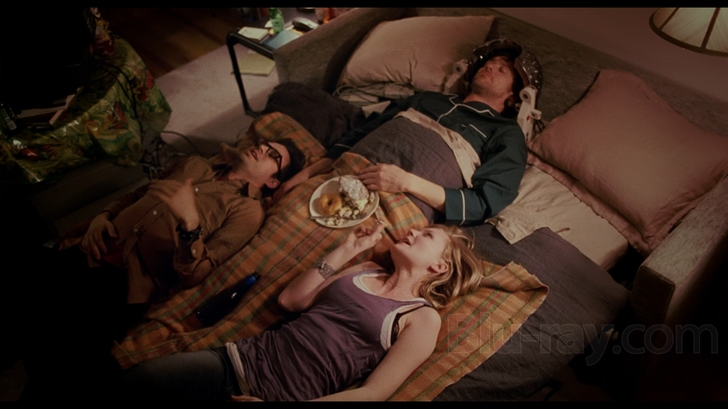
After a showing on HD-DVD what seems like ages ago—April 2007—followed by a Japanese Blu-ray release that was snapped up by eager importers, Eternal Sunshine finally makes it to Blu-ray in the U.S. with a 1080p/AVC-encoded transfer that's much better than merely acceptable but just shy of great. By and large, this is a satisfying high definition presentation and an immediately appreciable upgrade from the DVD. Clarity is not quite exemplary, but is certainly strong, with ample fine detail visible in the pores and whiskers on Jim Carrey's face, the patterns of cloth, and the textures and lines of in-focus background objects. Color also seems accurate to Gondry and cinematographer Ellen Kuras' intent, vacillating between warm early memories and the cold, ghostly palette of the flight through Joel's mind. (Of course, Clementine's ever-changing hair hues are always ultra-vibrant.) That said, there are a few minor issues that keep Eternal Sunshine from looking its best. Although grain appears entirely natural through much of the film, certain scenes have a slightly filtered, more artificial-looking quality—as if smoothed out with some light DNR—and there are also telltale traces of edge enhancement at times. Black levels also have a tendency to be a bit too dense, occasionally robbing the image of some of its shadow detail. However, none of these quibbles would keep me from picking up this disc. Eternal Sunshine still looks appropriately dreamy.
Eternal Sunshine of the Spotless Mind Blu-ray Movie, Audio Quality 
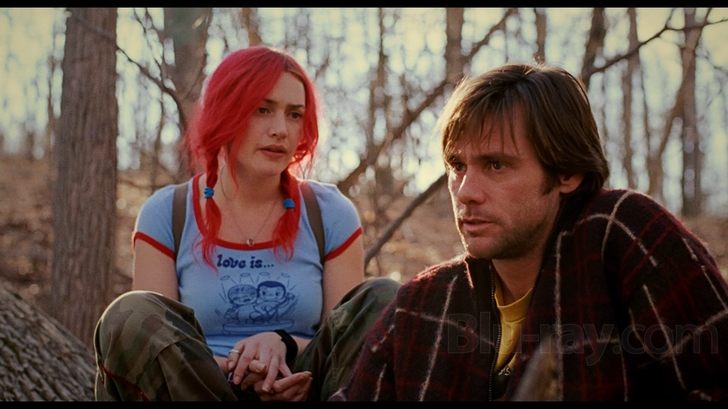
Perhaps the biggest improvement from Eternal Sunshine's DVD release is this Blu-ray's lossless DTS-HD Master Audio 5.1 surround track, which sounds wonderful. This is a film that's heavily dependent on its score and sound design. For every jarringly effective visual effect in Eternal Sunshine, there's an equally successful sequence of clever aural artistry. While Joel is unconscious, you'll often hear the distant voices of the technicians in the rear of the soundfield, blithely chattering away, and his and Clementine's flight through their shared memories is characterized by all sorts of creepy ambience, from vocal disintegrations to weird atmospheric swooshes and electric crackles. Another allure is Jon Brion's score, a strange overlay of from-another-time-period samples and orchestral arrangements. The music is spread nicely throughout the channels for an all-immersive presence. Dialogue is clear and balanced throughout, with no muffling, drop-outs, hisses, or pops. English SDH and French subtitles are available in easy- to-read white lettering.
Eternal Sunshine of the Spotless Mind Blu-ray Movie, Special Features and Extras 
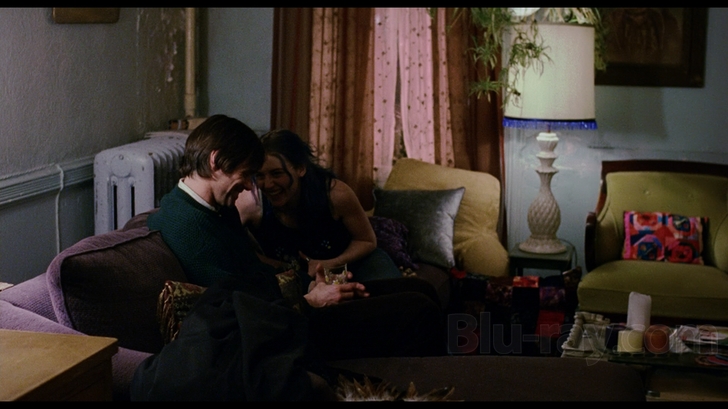
There are no new features here, but all of the supplementary materials from the HD-DVD have been ported over for the film's U.S. Blu-ray release:
- Feature Commentary with Director Michel Gondry and Writer Charlie Kaufman: If occasionally lapsing into silence, this is still an excellent commentary track, featuring two of the most idiosyncratic minds currently working in Hollywood.
- Extended/Deleted Scenes (SD, 25:44): Several deleted sequences, including many with Ellen Pompeo as Joel's former girlfriend, Naomi.
- A Look Inside Eternal Sunshine of the Spotless Mind (SD, 11:32): A fairly typical promo, with a general overview of the story and interviews with all the leads.
- A Conversation with Jim Carrey and Director Michel Gondry (SD, 15:35): Carrey and Gondry sit down in what looks like a high school band room to discuss their favorite and most challenging moments during the making of the film.
- A Conversation with Kate Winslet and Director Michel Gondry (SD, 14:24): Likewise, Winslet and Gondry discuss the characters and the making of the film.
- Inside the Mind of Director Michel Gondry (SD, 19:46): Here we explore Gondry's unique, largely in-camera way of approaching visual effects. The best feature on the disc!
- Anatomy of a Scene - Saratoga Avenue (SD, 17:18): A step-by-step guide through one of the most visually intricate scenes in the film. Also features some in-studio interviews with composer Jon Brion.
- Lacuna Infomercial (SD, 00:35): A fake commercial for Lacuna, Inc.
- The Polyphonic Spree "Light & Day" Music Video (SD, 3:03)
Eternal Sunshine of the Spotless Mind Blu-ray Movie, Overall Score and Recommendation 
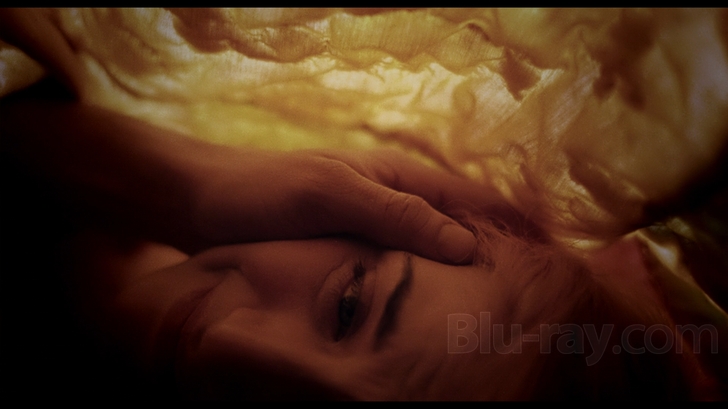
If you've ever gone through a painful breakup—with all the associated pining, anger, and longing to forget—and then found yourself in a position where you're considering patching things up, you'll likely relate to the relational quandaries posed in Eternal Sunshine: Can we change? Will we make the same mistakes? Does it matter? Is it worth it? Longtime fans are probably asking another question: Should I upgrade from my DVD copy of the film? That'll depend on your priorities. The extras are the same, but the film looks quite nice in high definition—although the transfer has its flaws—and Jon Brion's score sounds wonderful in lossless 5.1 audio. It's up to you. If you're new to Eternal Sunshine, though, this is definitely the version to get. Recommended!
Other editions
Eternal Sunshine of the Spotless Mind: Other Editions

Eternal Sunshine of the Spotless Mind
Universal 100th Anniversary
2004

Eternal Sunshine of the Spotless Mind 4K
2004

Eternal Sunshine of the Spotless Mind
4K Restoration
2004
Similar titles
Similar titles you might also like

Before Sunset
2004

Before Sunrise
1995

Annie Hall
The Woody Allen Collection
1977

Before Midnight
2013

The Tree of Life
2011

Blue Valentine
2010

Past Lives
2023

Amélie
Le fabuleux destin d'Amélie Poulain
2001

Lost in Translation
2003

Her
2013

Moonlight 4K
2016

Days of Heaven 4K
1978

Weekend
2011

To the Wonder
2012

The Motel Life
2012

Brief Encounter
1945

Carol
2015

Two Lovers
2008

City Girl
1930

My Blueberry Nights
2007